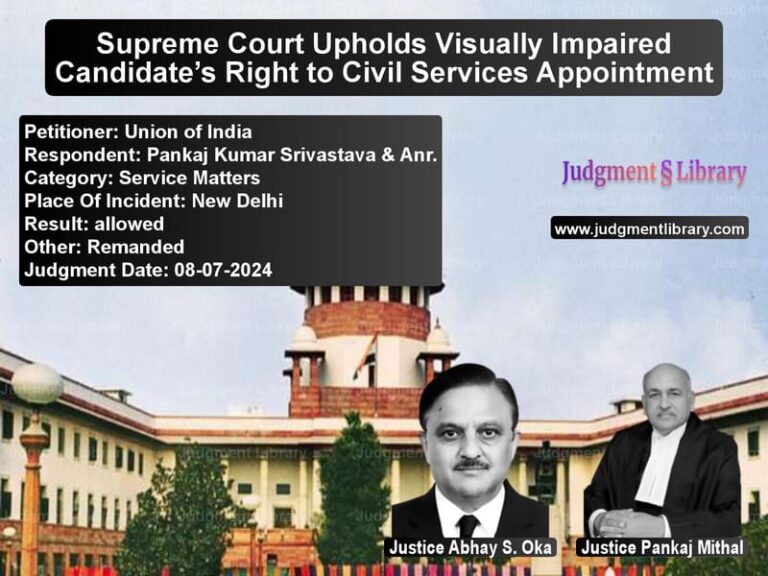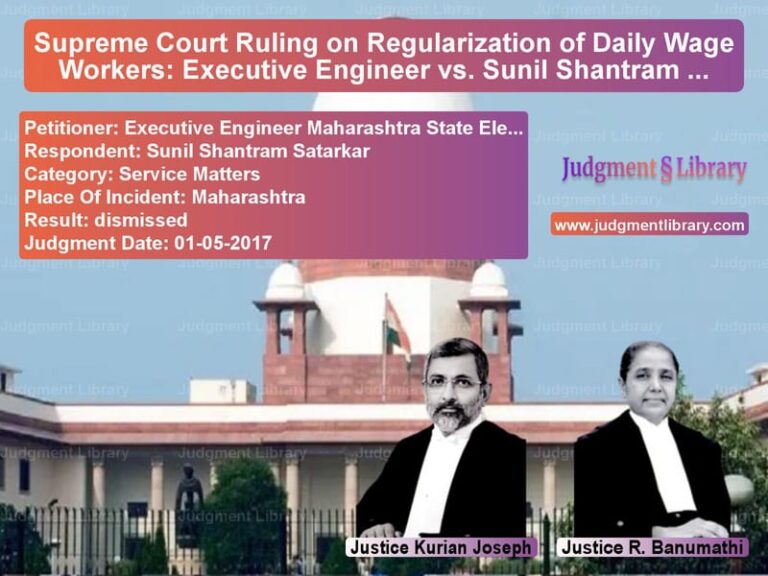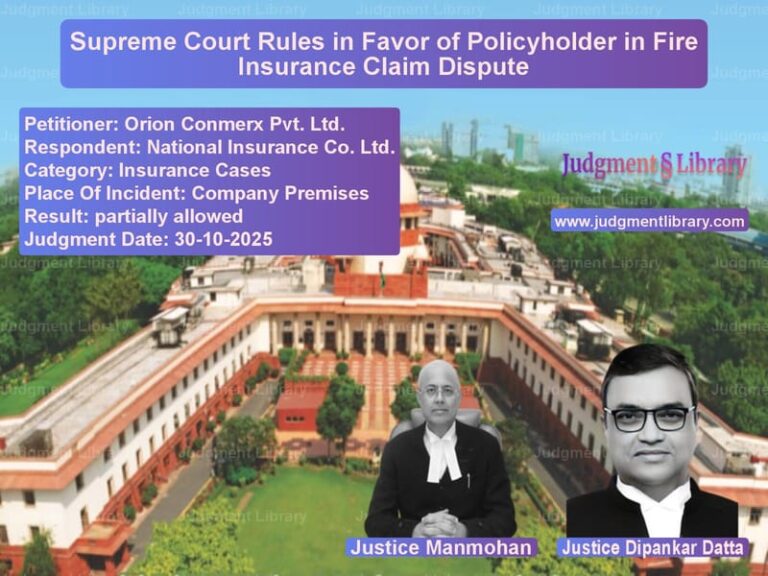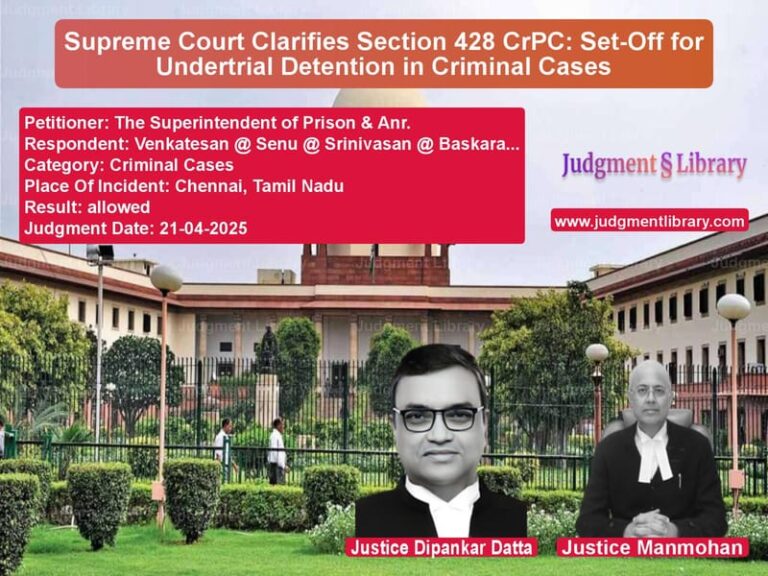Murder Conviction Modified: Supreme Court Alters Life Sentence to 10 Years in Family Land Dispute Case
In the case of Sanjay & Narendra v. State of Uttar Pradesh, the Supreme Court modified the conviction of two appellants involved in a family land dispute that escalated into a violent attack. Originally convicted under Section 302 IPC (murder) and sentenced to life imprisonment, the appellants’ conviction was altered to Section 304 Part I IPC (culpable homicide not amounting to murder), reducing their sentence to 10 years of rigorous imprisonment. The case sheds light on the complexities of intent, the role of medical evidence, and the interpretation of common intention under Section 34 IPC.
Background of the Case
The case revolves around a land dispute between Roop Singh (deceased) and his brother Sanjay (one of the appellants). According to the prosecution, Sanjay had already sold his land to co-accused Narendra and was pressuring his brother, Roop Singh, to do the same. However, Roop Singh refused, leading to growing hostility.
On the intervening night of August 10-11, 1998, Roop Singh and his wife, Sheela (PW-2), were sleeping in their courtyard under the glow of a lantern. Around 3:00 AM, the accused, Narendra, Sanjay, and an unidentified third person, armed with country-made pistols, entered their house. Narendra fired at Roop Singh, hitting him in the head, while Sanjay shot Sheela, causing injuries to her neck, abdomen, and right leg.
Trial Court Proceedings
The case was investigated, and the police registered Crime No. 387/1998 under Sections 307 and 452 IPC. Roop Singh was treated at Safdarjung Hospital, Delhi, and was discharged on September 25, 1998. However, his health deteriorated, and he passed away on October 13, 1998. As a result, the charge was amended to include Section 302 IPC (murder).
The prosecution presented evidence including:
- Eyewitness testimony from Sheela (PW-2), who survived the attack.
- Medical reports indicating that Roop Singh suffered a bullet wound to the head.
- The fact that the complaint was filed within 90 minutes of the attack.
The Additional Sessions Judge, Meerut, convicted both accused under Section 302 read with Section 34 IPC (common intention), sentencing them to life imprisonment. Additionally, they were sentenced to 10 years under Section 307 IPC (attempt to murder) and 3 years under Section 452 IPC (house trespass with preparation for assault).
High Court’s Decision
The appellants challenged their conviction before the Allahabad High Court. However, the court upheld the trial court’s judgment, stating that:
- The prosecution had established a clear motive.
- The presence of Sheela (PW-2) as an injured eyewitness made the case strong.
- The cause of death was linked to the gunshot wound inflicted by the accused.
Appeal Before the Supreme Court
The appellants took their case to the Supreme Court, arguing that:
- The deceased survived for 62 days after the shooting, indicating that the injury was not immediately fatal.
- The cause of death was septicaemia, not the gunshot itself.
- Their conviction under Section 302 IPC should be reconsidered.
Supreme Court’s Analysis and Judgment
1. Medical Evidence and Cause of Death
The court examined the testimony of Dr. Laxman Das (PW-9), the neurosurgeon who operated on Roop Singh. His findings revealed:
- The bullet was lodged in the supra-cellar region of the head.
- Despite being critically injured, Roop Singh was discharged in stable condition.
- His ultimate cause of death was septicaemia due to infection.
The court observed:
“The prosecution should have elicited an opinion from the doctor confirming whether the head injury was sufficient in the ordinary course of nature to cause death.”
2. Downgrading the Offense from Murder to Culpable Homicide
The Supreme Court cited Ganga Dass v. State of Haryana (1994), where the accused was initially convicted under Section 302 IPC, but the conviction was altered to Section 304 Part II IPC due to a prolonged survival period.
The court ruled:
“The proximate cause of death was septicaemia, which developed after medical intervention. Since Roop Singh survived for over two months, it cannot be inferred with certainty that the initial injury alone was sufficient to cause death.”
3. Common Intention Under Section 34 IPC
The defense argued that Sanjay did not shoot Roop Singh and thus should not be convicted under Section 302 IPC read with Section 34 IPC. However, the court rejected this claim, stating:
“The common intention is evident from the fact that both accused entered the house together, armed with pistols, and fired at both victims.”
Final Judgment
The Supreme Court modified the convictions as follows:
- Conviction under Section 302 IPC was altered to Section 304 Part I IPC (culpable homicide not amounting to murder).
- Both accused were sentenced to 10 years of rigorous imprisonment.
- Convictions under Sections 307 IPC and 452 IPC remained unchanged.
Key Takeaways
- Medical evidence is crucial in distinguishing murder from culpable homicide.
- Survival after an injury does not always imply intent to kill.
- Common intention can be inferred from the actions of co-accused.
- The cause of death must be directly attributable to the accused’s actions.
Conclusion
The judgment in Sanjay & Narendra v. State of Uttar Pradesh reflects the importance of examining medical evidence in determining the nature of an offense. By altering the conviction to Section 304 Part I IPC, the Supreme Court ensured that justice was served while acknowledging the complexities surrounding the cause of death. The ruling reinforces the need for courts to carefully assess forensic findings before assigning culpability.
Don’t miss out on the full details! Download the complete judgment in PDF format below and gain valuable insights instantly!
Download Judgment: Sanjay & Narendra vs State of Uttar Prade Supreme Court of India Judgment Dated 06-01-2016.pdf
Direct Downlaod Judgment: Direct downlaod this Judgment
See all petitions in Murder Cases
See all petitions in Attempt to Murder Cases
See all petitions in Judgment by T.S. Thakur
See all petitions in Judgment by R. Banumathi
See all petitions in partially allowed
See all petitions in Modified
See all petitions in supreme court of India judgments January 2016
See all petitions in 2016 judgments
See all posts in Criminal Cases Category
See all allowed petitions in Criminal Cases Category
See all Dismissed petitions in Criminal Cases Category
See all partially allowed petitions in Criminal Cases Category







